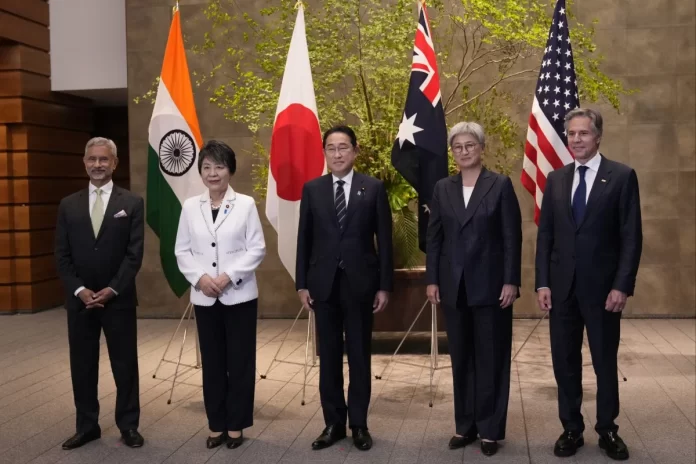Foreign ministers of Quad nations from Australia, India, Japan, and the United States met this week in Tokyo. They expressed serious concerns about recent aggressive actions in the South China Sea. Their meeting aimed to send a clear message to China about the situation in the region. The ministers included Australia’s Penny Wong, India’s Subrahmanyam Jaishankar, Japan’s Yoko Kamikawa, and Antony Blinken from the US.
Concerns Over Maritime Security
The Quad nations pledged to enhance maritime security in the South China Sea. They did not name China directly but highlighted their worries about the situation in the East and South China Seas. Their joint statement stressed strong opposition to any unilateral actions that try to change the status quo through force or coercion.
Recent Conflicts in the South China Sea
In recent months, tensions have increased between China and the Philippines. Chinese personnel have used water cannons against Philippine vessels. They have also boarded these ships with axes and machetes. Additionally, they have destroyed equipment to disrupt resupply missions to the Second Thomas Shoal. These actions have heightened the conflict in the region.
China’s Reaction on Quad Statement
China responded to the Quad’s statement with criticism. Chinese foreign ministry spokesman Lin Jian accused the Quad of creating tension and inciting confrontation. He claimed that the Quad was trying to contain the development of other countries.
Significant Developments in the Quad Joint Statement
Satoru Nagao from the Hudson Institute noted that the South China Sea issue was mentioned earlier in the joint statement than before. It was highlighted in the fifth paragraph, compared to the 29th paragraph in the statement from last May’s Quad leaders’ summit. This shift emphasises the Quad’s concern about China’s actions against the Philippines.
The statement also mentioned the 2016 arbitral tribunal ruling for the first time. This ruling found China’s claims in the South China Sea to have no legal basis. Nagao called this mention a “significant milestone” for resolving disputes.
Military Support for the Philippines
The Quad countries are stepping up their military support for the Philippines. The US is sending more military forces and Tomahawk missiles to the country. Australia has also sent troops to help. Japan has agreed to send fighter jets and naval ships to the Philippines. India has given the Philippines advanced BrahMos missiles. All this support is meant to help the Philippines defend itself from possible threats from China.
US Investment in Philippine Military
On Tuesday, the US announced a $500 million investment to modernize the Philippines’ military. US Defense Secretary Lloyd Austin described this as a “once-in-a-generation investment.” This funding will help enhance the capabilities of the Philippine military.
Quad Encouraging Initiatives in Technology
The meeting also saw discussions on technology and cybersecurity. The Quad nations plan to appoint cyber ambassadors to oversee capacity-building projects and responsible behavior in cyberspace. They will hold an international cyber conference in the Philippines and a cyber boot camp in India. Additionally, they will work on deepening cooperation in artificial intelligence systems and governance.
New Legal Dialogue on Maritime Issues
A notable outcome of the meeting was the creation of a Quad legal dialogue. This dialogue aims to boost expertise on maritime international law. It will support the Quad’s efforts to uphold a rules-based maritime order in the Indo-Pacific region.
Expansion of Maritime Domain Awareness
The Indo-Pacific Partnership for Maritime Domain Awareness (IPMDA) is getting bigger. It started in May 2022 and helps countries share information about the sea. This information helps fight illegal fishing and improves sea surveillance. The IPMDA has now teamed up more closely with the Information Fusion Centre-Indian Ocean Region (IFC-IOR). The IFC-IOR is a security center run by the Indian Navy that works on keeping the Indian Ocean safe.
Future Quad Leaders’ Meeting
The discussions in Tokyo set the stage for a future Quad leaders’ meeting. This summit might occur after the U.S elections in November. With President Joe Biden dropping out of the 2024 presidential race, his focus is shifting to domestic issues. The Quad’s leaders are expected to meet soon to further address regional and global challenges.
India’s Diplomatic Balance
Lee-Brown from the University of Western Australia said that India’s recent meetings with Russia probably won’t change what happened at the Quad meeting. Even though India is still working with Russia, the Quad countries are still focused on working together on important issues in the region.
In summary, the Quad nations’ recent meeting in Tokyo marked a significant step in addressing South China Sea tensions and enhancing regional security. The discussions also highlighted new initiatives in technology and legal frameworks to support a stable and secure Indo-Pacific region.

